pocket academic writing style guide for humanities
The key to this style guide is in its subtitle: ‘Notes for Authors, Editors, and Writers of Theses’. It has been produced by the Modern Humanities Research Association as a manual of advice and procedures for people preparing texts for publication. The MHRA Style Guide assembles a set of conventions to help users through the minutiae of the scholarly editing and presentation of texts.
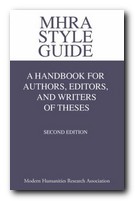 If you are a student, a researcher, or a writer, the net result is a brief and very usable guide. One of its principal advantages over other guides is its brevity: it only includes the essentials, and everything is easy to find. And yet it covers everything you would normally require for academic writing or formal publication – from spelling, abbreviations, and punctuation through to the thorny issue of bibliographic referencing, which is what often drives students into fits of nail-biting frenzy.
If you are a student, a researcher, or a writer, the net result is a brief and very usable guide. One of its principal advantages over other guides is its brevity: it only includes the essentials, and everything is easy to find. And yet it covers everything you would normally require for academic writing or formal publication – from spelling, abbreviations, and punctuation through to the thorny issue of bibliographic referencing, which is what often drives students into fits of nail-biting frenzy.
It’s all very succinct, and yet manages to pack in the presentation of foreign languages, citations from articles, journals, and newspapers, and even a nod towards the Author-Date (or Harvard) system of referencing.
The latest edition has been expanded to cover preparing texts for electronic publication and there are sections on indexing and writing a thesis or a dissertation. There’s a glossary, sections on book reviews and correcting proofs, and a good index.
I first came across this book when it was chosen by the Open University as a set text for some of its postgraduate courses. Getting students to follow the conventions is still hard work, but it’s a lot easier than it used to be.
What I like most about the book is that it gives you the impression that you’re just about to publish an important piece of work. Since it’s also amazingly cheap, it’s worth buying as a confidence-booster alone.
© Roy Johnson 2008
MHRA Style Guide: Notes for Authors, Editors, and Writers of Theses, London: Modern Humanities Research Association, new second edition 2008, pp.95, ISBN: 0947623620
More on writing skills
More on language
More on grammar

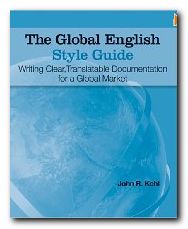
 Doing Your Research Project: A Guide for First-Time Researchers in Education and Social Science is a best-selling UK guide which covers planning and record-keeping, interviewing, reviewing ‘the literature’, questionnaires, and writing the final report. Even if you are studying a subject other than education or social science, this is a wonderfully helpful guide on organising your ideas and your writing at research level. It’s a model of clarity and good sense. Now in its third edition – and deservedly so. Highly recommended.
Doing Your Research Project: A Guide for First-Time Researchers in Education and Social Science is a best-selling UK guide which covers planning and record-keeping, interviewing, reviewing ‘the literature’, questionnaires, and writing the final report. Even if you are studying a subject other than education or social science, this is a wonderfully helpful guide on organising your ideas and your writing at research level. It’s a model of clarity and good sense. Now in its third edition – and deservedly so. Highly recommended.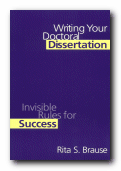 Writing your Doctoral Dissertation: Invisible Rules for Success is a US guide to writing at post-graduate level which uses practical examples, is strong on planning, and offers advice on negotiating the process of research – from making an application to submitting a dissertation. It’s also good on the issue of selecting a research topic and developing it into a feasible project. One of the features which has made this a popular choice is that it offers tips from former students on the problems they have faced in doing research – and how they have overcome them.
Writing your Doctoral Dissertation: Invisible Rules for Success is a US guide to writing at post-graduate level which uses practical examples, is strong on planning, and offers advice on negotiating the process of research – from making an application to submitting a dissertation. It’s also good on the issue of selecting a research topic and developing it into a feasible project. One of the features which has made this a popular choice is that it offers tips from former students on the problems they have faced in doing research – and how they have overcome them. If you have any serious intention of preparing text for publication, then Copy-Editing: The Cambridge Handbook for Editors, Authors and Publishers is your encyclopedia on typography, style, and presentation. It has become the classic UK guide and major source of reference for all aspects of editing and text-presentation, covering every possible bibliographic detail. It also covers a wide range of subjects – from languages to mathematics and music – as well as offering tips on copyright and preparing text for electronic publication.
If you have any serious intention of preparing text for publication, then Copy-Editing: The Cambridge Handbook for Editors, Authors and Publishers is your encyclopedia on typography, style, and presentation. It has become the classic UK guide and major source of reference for all aspects of editing and text-presentation, covering every possible bibliographic detail. It also covers a wide range of subjects – from languages to mathematics and music – as well as offering tips on copyright and preparing text for electronic publication.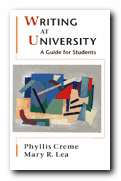 Writing at University: a guide for students is a popular UK guide to understanding questions, planning assignments, reading and note-taking, and developing arguments. It puts a lot of emphasis on the process which leads up to the act of writing, and tries to show you how to develop more confidence. Different types of writing are discussed, as well as the important skill of matching your writing to the conventions of the discipline you are studying. The approach is like that of a sympathetic counsellor.
Writing at University: a guide for students is a popular UK guide to understanding questions, planning assignments, reading and note-taking, and developing arguments. It puts a lot of emphasis on the process which leads up to the act of writing, and tries to show you how to develop more confidence. Different types of writing are discussed, as well as the important skill of matching your writing to the conventions of the discipline you are studying. The approach is like that of a sympathetic counsellor.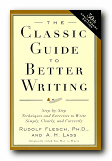 The Classic Guide to Better Writing is more-or-less what its title suggests. It’s a best-selling US guide with emphasis on how to generate, plan, and structure your ideas. It also covers basic grammar, good style, and common mistakes. The approach is step-by-step explanations on each topic, plenty of good advice on how to avoid common mistakes, and tips on how to gain a reader’s attention. Suitable for all types of writing, it well deserves its good reputation.
The Classic Guide to Better Writing is more-or-less what its title suggests. It’s a best-selling US guide with emphasis on how to generate, plan, and structure your ideas. It also covers basic grammar, good style, and common mistakes. The approach is step-by-step explanations on each topic, plenty of good advice on how to avoid common mistakes, and tips on how to gain a reader’s attention. Suitable for all types of writing, it well deserves its good reputation. If you need just one book which will answer all your questions on writing – from punctuation to publication – then this is it. The Little, Brown Handbook is an encyclopaedic US guide to all aspects of writing. It includes vocabulary, punctuation, grammar, style, document design, MLA conventions, editing, bibliography, and the Internet. All topics are profusely illustrated and cross-indexed, and some of the longer entries are virtually short essays. It also has self-assessment exercises so that you can check that you have understood the contents of each chapter. The Swiss army penknife of writing guides. Highly recommended.
If you need just one book which will answer all your questions on writing – from punctuation to publication – then this is it. The Little, Brown Handbook is an encyclopaedic US guide to all aspects of writing. It includes vocabulary, punctuation, grammar, style, document design, MLA conventions, editing, bibliography, and the Internet. All topics are profusely illustrated and cross-indexed, and some of the longer entries are virtually short essays. It also has self-assessment exercises so that you can check that you have understood the contents of each chapter. The Swiss army penknife of writing guides. Highly recommended.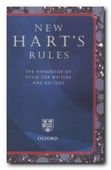 Hart’s Rules for Compositors and Readers at the University Press Oxford This is a UK classic guide to the finer points of editing and print preparation, spelling and typography. It was first written as the style guide for OUP, but quickly established a reputation well beyond. There’s no hand-holding here. Everything is pared to the bone. the centre of the book deals with ‘difficult’ and irregular spellings. A masterpiece of compression, it is now in its thirty-ninth edition. This is one for professionals rather than student writers.
Hart’s Rules for Compositors and Readers at the University Press Oxford This is a UK classic guide to the finer points of editing and print preparation, spelling and typography. It was first written as the style guide for OUP, but quickly established a reputation well beyond. There’s no hand-holding here. Everything is pared to the bone. the centre of the book deals with ‘difficult’ and irregular spellings. A masterpiece of compression, it is now in its thirty-ninth edition. This is one for professionals rather than student writers.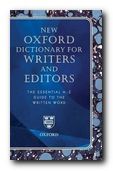 The Oxford Dictionary for Writers & Editors . This is a specialist dictionary for writers, journalists, and text-editors. Unlike most dictionaries, it does not offer explanations of the words meanings. It deals with problematic English and foreign words, offering correct spellings and consistent usage in the OUP house style. By concentrating on difficult cases, it saves you a lot of time. The latest edition also includes American spellings. Strongly recommended.
The Oxford Dictionary for Writers & Editors . This is a specialist dictionary for writers, journalists, and text-editors. Unlike most dictionaries, it does not offer explanations of the words meanings. It deals with problematic English and foreign words, offering correct spellings and consistent usage in the OUP house style. By concentrating on difficult cases, it saves you a lot of time. The latest edition also includes American spellings. Strongly recommended.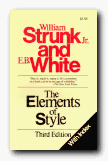 The Elements of Style. This is an old favourite – a ‘bare bones’ guidance manual which cuts out everything except the essential answers to the most common writing problems. It covers the elements of good usage, how to write clearly, commonly misued words and expressions, and advice on good style. The emergency first-aid kit of writing guides. It’s very popular, not least because it’s amazingly cheap. Suitable for beginners. There’s an online version available if you do a search – but the cost of a printed version will pay dividends.
The Elements of Style. This is an old favourite – a ‘bare bones’ guidance manual which cuts out everything except the essential answers to the most common writing problems. It covers the elements of good usage, how to write clearly, commonly misued words and expressions, and advice on good style. The emergency first-aid kit of writing guides. It’s very popular, not least because it’s amazingly cheap. Suitable for beginners. There’s an online version available if you do a search – but the cost of a printed version will pay dividends.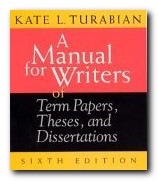 A Manual for Writers of Term Papers, Theses, and Dissertations. This is a modern American classic guidance manual for academic writing. It covers everything from abbreviations and numbers to referencing and page layout. It also includes sections showing how to lay out tables and statistics; lots on bibliographic referencing; and how to deal with public and government documents. The latest edition also includes advice on word-processing.
A Manual for Writers of Term Papers, Theses, and Dissertations. This is a modern American classic guidance manual for academic writing. It covers everything from abbreviations and numbers to referencing and page layout. It also includes sections showing how to lay out tables and statistics; lots on bibliographic referencing; and how to deal with public and government documents. The latest edition also includes advice on word-processing.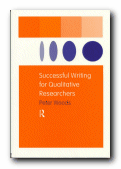 Successful Writing for Qualitative Researchers. This is one for specialist academic writing at post-graduate level. It covers all the stages of creating a scholarly piece of work – from the preparation of a project through to the completion and possible publication of the finished article. Includes sections on style, editing, and collaborative writing. It takes a positive and encouraging tone – which will be welcome to those embarking on such tasks for the first time.
Successful Writing for Qualitative Researchers. This is one for specialist academic writing at post-graduate level. It covers all the stages of creating a scholarly piece of work – from the preparation of a project through to the completion and possible publication of the finished article. Includes sections on style, editing, and collaborative writing. It takes a positive and encouraging tone – which will be welcome to those embarking on such tasks for the first time.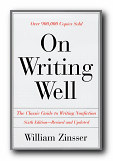 On Writing Well. This is a best-selling title, now in its sixth edition. It offers reassuring guidance from an experienced journalist on writing more effectively in a number of genres. He covers interviews, travel writing, memoirs, sport, humour, science and technology, and business writing. The approach is to take a passage and analyse it, showing how and why it works, or where it might be improved. It is particularly good on editing and re-writing.
On Writing Well. This is a best-selling title, now in its sixth edition. It offers reassuring guidance from an experienced journalist on writing more effectively in a number of genres. He covers interviews, travel writing, memoirs, sport, humour, science and technology, and business writing. The approach is to take a passage and analyse it, showing how and why it works, or where it might be improved. It is particularly good on editing and re-writing.